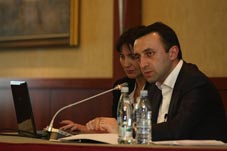
Human right in focus of new police ethics code
By Keti Arjevanidze
Wednesday, January 23
“The main focus of the code is the protection of human rights, which happens to be one of the most sensitive issues for Georgian society,” stated Irakli Gharibashvili, Minister of Interior Affairs (MIA) at the presentation of the new police ethics code, on January 22.
According to the minister, the main wish of the ruling Georgian Dream is to make the police as exemplary citizens; he mentioned that the police’s new ethics code contains the norms which create an opportunity to get a “recovered system and new police.”
A special interior monitoring service will control how Georgian police officers will protect human rights, and will be staffed by approximately 50 people. “If there is a human rights violation, we will have an instant reaction, ranging from disciplinary punishment to criminal code responsibility,” explained the Minister.
Gharibashvili scrutinized the norms included in the code, according to which, the police officer’s relationship with society, colleagues, attitudes towards detainees, the usage of power and firearms, standard activities during the investigation and other important norms and regulations are determined in detail.
The code represents the unity of the ethical and moral principles in the work of the police. It relies on the basic standards and principles of the UN and the Council of Europe as well as the European Code of Police Ethics and other international and national legislative acts.
The minister also admitted that there are special norms in the code which strengthen the legacy and private responsibility of policemen, preventing the policemen from making unlawful orders.
Gharibashvili commented that every policeman should be conscious that they represent an unbiased, legal state institution, as well as be a friend and supporter of every citizen.
The interior minister concluded that policeman’s professionalism and ethical activity is the guarantee of trust in society, “that is why we created the police ethics code; it is one more step forward,” Gharibashvili stated.
Minister Gharibashvili said the newly created agency of reforms and developments worked out the MIA’s development strategy for 2013, which proves that the ministry strives towards reforms and development.
Different state institutions, diplomatic missions and international organizations also attended the ethics code presentation. Some NGOs attending the presentation, also consider the new police ethics code as a step forward.
Nazi Janezashvili, Executive Director of Constitution: Article 42, welcomed the decision to prioritize human rights. “The MIA used to roughly violate human rights over the years, especially at the stage of an investigation,” said the NGO representative.
The police’s freedom from political influence was one of the remarkable aspects of the code for International Transparency-Georgia’s Executive Director, Eka Gigauri.

